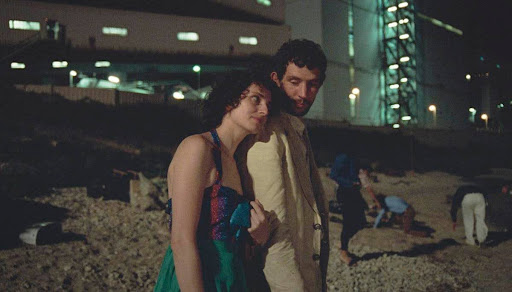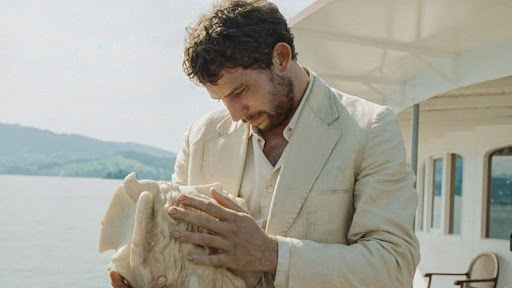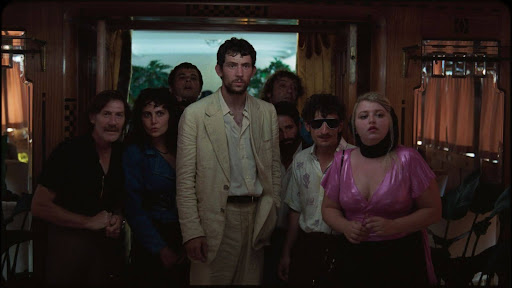The way I describe the films of Alice Rohrwacher is more along the lines of how I describe my latest perfume obsession. They’re mossy, warm, dirty in the best way, and rich with earthy texture. I can smell her films as much as I can feel them, and LA CHIMERA, her latest film (and my favorite of 2023) is no exception.
Arthur (Josh O’Connor), an English archaeologist fresh out of Italian prison in the 1980s, falls asleep on the train and dreams of his dead lover, Beniamina (Yle Vianello), in camera flashes. On arrival, his hometown group of ruffians are eager to get him back to work as the de facto leader of their merry gang of grave robbers, thanks to Arthur’s spiritual gift. Arthur doesn’t just see the dead in his dreams—he’s able to sense their otherworldly presence, leading him and his friends to burial sites ripe for plundering. This has made him a bit of a legend in his small Etruscan village, but he would rather hide in the cavernous, dusty mansion belonging to Beniamina’s mother, Flora (Isabella Rossellini), and join her in the futile wait for Beniamina’s return, despite the disapproving clucking of Flora’s brood of adult daughters. The daughters want to sell the house, but Flora protests: What if Beniamina returns? Where will she go then?

Of course, since this is also a compelling adventure film, Arthur is unable to resist the sweet chase of the artifacts, but there is still a disconnect between him and his friends, who are in it for the large sums of money that come with illegal trade deals. At first, this doesn’t really bother Arthur at all—he is more than happy to oblige his friends in their money-grubbing ways, in spite of the risk—until the influence of the virtuous and awkwardly tone-deaf Italia (Carol Duarte) changes his tune. It isn’t the risk of going to jail that sours Arthur on grave robbing, but the realization that these artifacts are meant only for the eyes of souls, not living people. The two form an unexpected bond, although no one can rival Arthur’s beloved Beniamina, who proves to be both his salvation and his downfall.
Without the strong supporting performances, there would be very little to say about the sense of community in LA CHIMERA. When the village holds its annual celebration of the Epiphany, their community’s vibrancy is on full display; the men dress up like ladies and, of course, everyone is drunk. There’s Pirro (Vincenzo Nemolato), Arthur’s best friend who picks him up from the train station and convinces him to return to the fold. Pirro forms an innocent crush on Melodie (Lou Roy-Lecollinet), the wealthy blonde who dances around the fire after the parade in a Fellini-like gesture and takes photos of everyone. He likes her because when she pees outside, it makes a big hole instead of smaller droplets. This makes a big impression on him. When Arthur finds a possible excavation spot, Pirro uses a bottle of Fernet to mark the spot in which they will return after dark.
Fabriana (Ramona Fiorini) is the tough girl of the group; she feigns annoyance at always being tasked with keeping watch. Underneath her tough exterior is a real sweetness that is revealed more and more as the film unfolds. Despite a short amount of screentime, Alice Rohrwacher’s sister, Alba Rohrwacher, gives one of the most commanding performances as the evil girlboss art dealer, Spartaco. The delicate, highly feminine nature of her facial features somehow make her all the more terrifying when she’s stealing from Arthur and his friends. She is at once both a dainty bird and the fox ready to gnash that bird to shreds.

Spartaco’s schemes split the gang up, and due to Arthur’s inability to continue along with digging up graves, a second community pops up in an abandoned train station—this time, it’s a matriarchy, led by Italia and Fabriana, who are able to put their differences aside for the sake of their newfound community. This indicates an important shift away from the male-led communities of Fellini films such as AMARCORD. It is so rare to see exclusively female communities on screen, especially below the poverty level, and it’s beautiful to witness.
O’Connor and Rossellini share a closeness that comes with sharing a secret; they are conspirators in the business of keeping their loved one alive. Flora should not be so loveable; she orders Italia around in a rather disrespectful fashion, and she has much more affection for Arthur, a criminal, than she does for any of her living daughters. It’s difficult to blame her once we see their dismissiveness towards Flora. Arthur is the only one who really sees and hears her. Arthur exemplifies the bad boy with a sensitive side that every girl longs for—yes, he’s been to jail and he robs graves with his dirtbag friends, but he is also gentle with his elderly mother-in-law and he misses his dead wife. It doesn’t hurt that he looks so good, skulking around the Etruscan countryside in an all-white linen suit.
Rohrwacher employs a number of visual techniques to remind us that what we are watching is a cinematic dream. LA CHIMERA’s opening frame shows Arthur’s dreams of Beniamina in flashes of film stock, as if he is watching a PARIS, TEXAS-style home movie in his sleep or in his daydreams. When Melodie photographs Arthur and his friends, I am reminded that one day they too will be sequestered to the recesses of memory. Occasionally, either to ratchet up tension or humor in a scene, Rohrwacher manipulates the frame rate in a way that is reminiscent of silent cinema. When Arthur feels a particularly strong pull toward the world of the dead, the camera slowly flips upside down, so that we get his mirror reflection from above—not in a sinister STRANGER THINGS way that implies the afterlife is something to be feared, this isn’t The Upside Down. Here, the afterlife is something to be revered, even sought after.

In 1966, Susan Sontag wrote that “the project of interpretation is largely reactionary, stifling… to interpret is to impoverish, to deplete the world—in order to set up a shadow world of ‘meanings.’” With LA CHIMERA, Rohrwacher resists the idea of cinema as excavation, ironic considering both Arthur’s illicit tomb raider occupation and the multilayered nature of the story. The ancient tombs are not meant for human excavation, and neither is the film. Yes, there’s the surface-level adventure story about grave robbers being cheated by a greedy art dealer, and the deeper story of Arthur’s search for his long lost love, but if you go digging around for hidden meanings, then LA CHIMERA’s spiritual magic will be lost on you. Instead, let Rohrwacher’s magic wash over you, as the ocean waves wash over the sand. Rohrwacher’s cinema is all about feeling in defiance of intellect, about having faith in the things you cannot see, and that’s what makes it so special. A lot of films that came out this year were fun to dissect (did Sandra Hüller’s ANATOMY OF A FALL character push her husband to his death? Is MAY DECEMBER a camp comedy or a stark melodrama?), but LA CHIMERA stands out as an example of a film that can stand on its own two feet, without any need for “discourse.”
I find LA CHIMERA most akin to Rohrwacher’s debut, CORPO CELESTE, for its tangibly dank atmosphere. I dare you to watch either film and not breathe in the abandoned church with young Marta, or the wet earth of the subterranean graves with Arthur. Arthur and Marta are both on a quest to discover the divine, despite the opposition of their respective communities. Marta’s quest may be more overtly religious, as she seeks the truth about Jesus’ life on Earth, but Arthur’s quest is no less spiritual just because it lacks any overtly religious tones. Arthur and Marta both listen to their hearts as they are drawn to what they cannot understand with their heads, what no one around them has the capacity to understand.
Looking back on the year, I can confidently say that LA CHIMERA is the underdog of 2023. After a successful festival run, it was unceremoniously dropped by Neon for one week in only one NYC theater, Linden Boulevard Multiplex Cinemas, at the end of December, leaving the film unseen by wider audiences and shunned by most awards bodies. I mention this disappointing US distribution deal less to lament it and more to express hope for the film’s future. Neon will release LA CHIMERA in select theaters March 29, 2024.















Comments